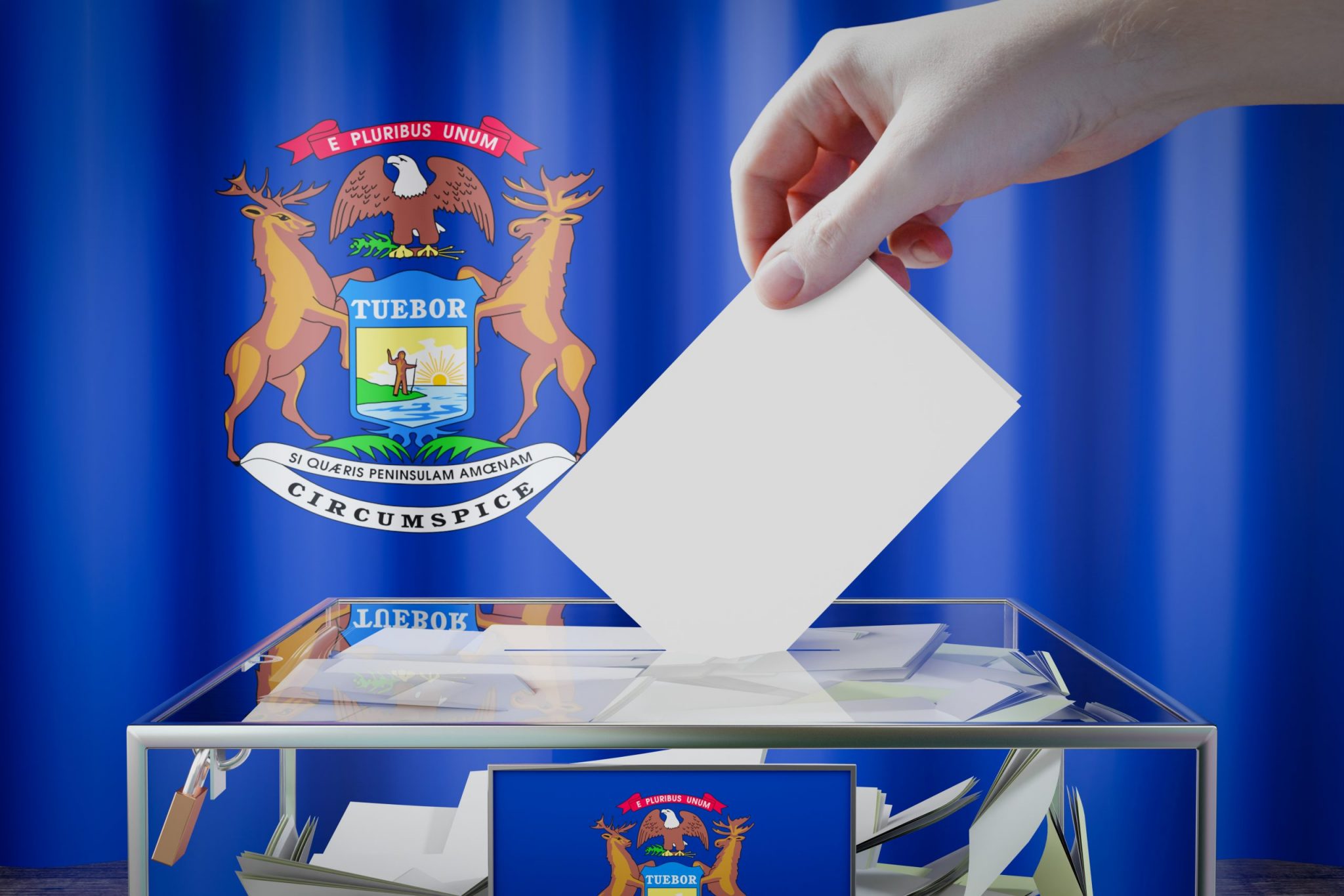The Midterm Monitor is an interactive tool that provides a snapshot of social media messages and narratives shaping the conversation around voting and election administration in the leadup to the 2022 midterm elections. The Midterm Monitor tracks social media posts for a subset of candidates for office, news outlets, and other key messengers. Learn more.
This week, the Midterm Monitor Report dives into the battleground state of Michigan. A few takeaways:
- The Democrat and Republican secretary of state candidates in Michigan—Jocelyn Benson and Kristina Karamo—were, respectively, the second and fourth most retweeted secretary of state candidates nationwide between September 22 and October 21. Benson is also the most followed secretary of state candidate nationwide on Twitter.
- GOP secretary of state candidate Kristina Karamo received roughly three times more comments (991) and likes (19,604) than any other monitored secretary of state candidate during the studied period on Instagram. She was also responsible for the top eight most liked posts on Instagram, several of which promoted claims of widespread voter fraud in the 2020 election. Karamo’s Rumble channel, where she has created a video series dedicated to the alleged improprieties of her opponent, received more than double the views of any monitored candidate nationwide between September 22 and October 21.
- Despite the fact that nine monitored candidates in Michigan have at least raised questions about—if not outright denied—the results of the 2020 election, Kristina Karamo was the only candidate in Michigan to regularly embrace election fraud narratives.
- The Democrat and Republican candidates for governor in Michigan—Gretchen Whitmer and Tudor Dixon—were affiliated with the most retweeted accounts and pages of any monitored Michigan candidates on Twitter and Facebook. But Dixon far outpaced Whitmer in engagement, earning nearly twice as many retweets on Twitter and more than four times as many reactions on Facebook as her Democratic rival during the studied period. Dixon also ranked as the eighth most retweeted gubernatorial candidate nationwide on Twitter and the ninth most reacted to gubernational candidate nationwide on Facebook during the studied period.
- The arrest of the CEO of a Michigan-based election worker management company provided substantial material for prominent election deniers—both among candidates and in the media.
Battleground State Deep Dive: Michigan
Most Influential Candidates on Social Media
With no US senate seats up for election in Michigan this year, the Republican and Democratic candidates for governor—Tudor Dixon and Gretchen Whitmer—have attracted by far the most attention of any monitored Michigan candidates on social media. The gubernatorial candidates earned the most and second most retweets on Twitter and reactions on Facebook among monitored Michigan candidates between September 22 and October 21. But Dixon far outpaced even Whitmer, earning nearly twice as many retweets on Twitter and more than four times as many reactions on Facebook as her Democratic rival during the studied period. Dixon also ranked as the eighth most retweeted gubernatorial candidate nationwide on Twitter and the ninth most reacted to gubernational candidate nationwide on Facebook during the studied period.
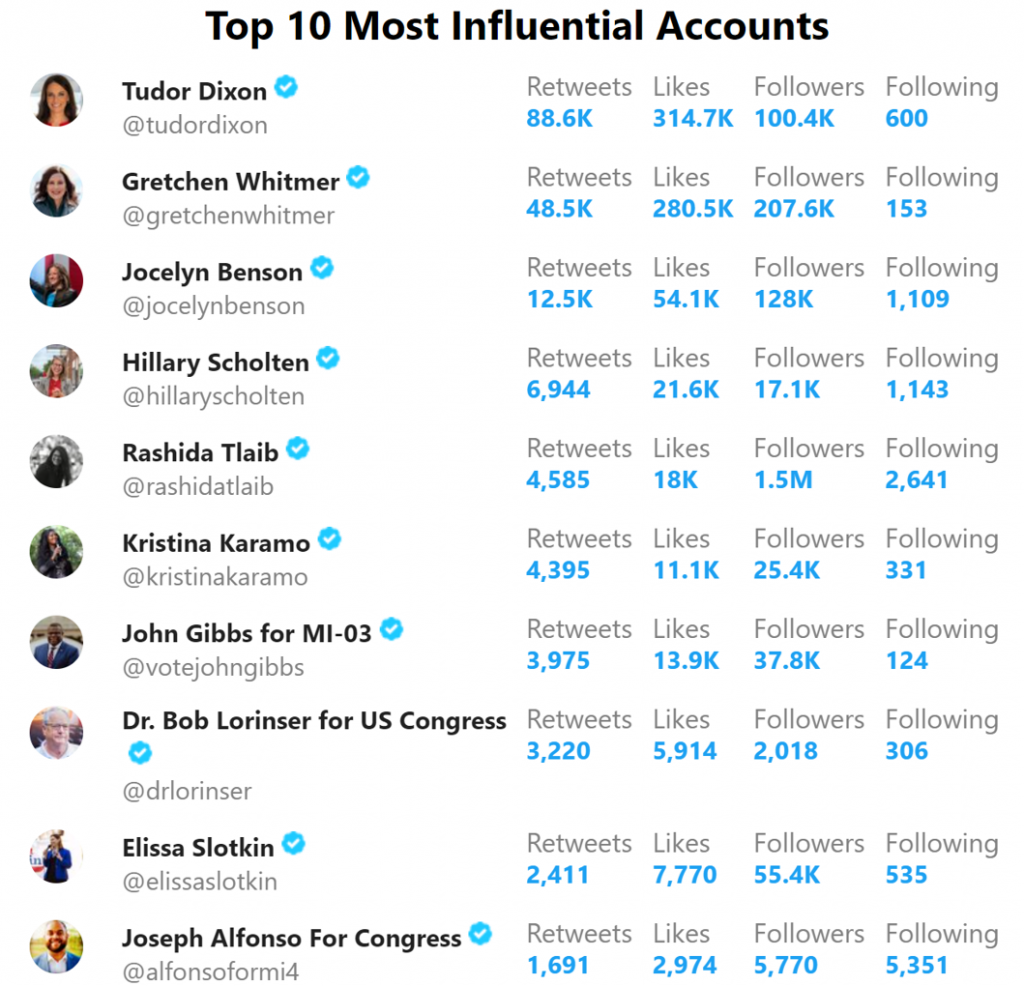
The most influential Twitter accounts affiliated with monitored candidates in Michigan between September 22 and October 21, rank ordered by retweets.
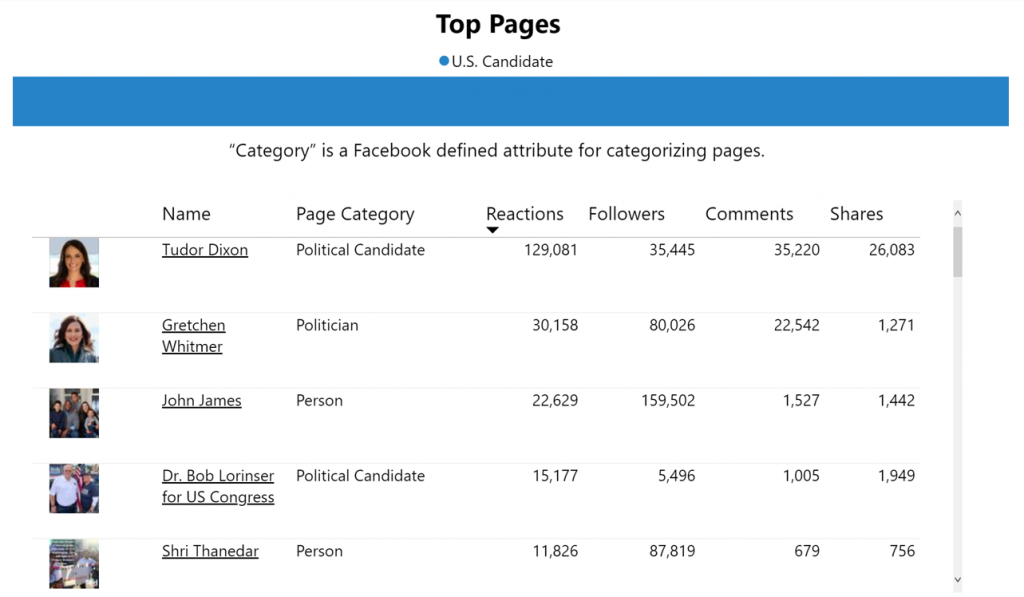
The most influential Facebook pages affiliated with monitored candidates in Michigan between September 22 and October 21, rank ordered by reactions.
Though they received far less engagement than their respective parties’ candidates for governor, the Democrat and Republican secretary of state candidates in Michigan—Jocelyn Benson and Kristina Karamo—were, respectively, the second and fourth most retweeted secretary of state candidates nationwide between September 22 and October 21. Benson is also the most followed secretary of state candidate nationwide on Twitter. Karamo, however, was particularly visible on other monitored platforms. On Instagram, Karamo received roughly three times more comments (991) and likes (19,604) than any other monitored secretary of state candidate during the studied period. She was also responsible for the top eight most liked posts, several of which promoted claims of widespread voter fraud in the 2020 election. Karamo’s Rumble channel, where she has created a video series dedicated to the alleged improprieties of her opponent, received more than double the views of any monitored candidate nationwide between September 22 and October 21.
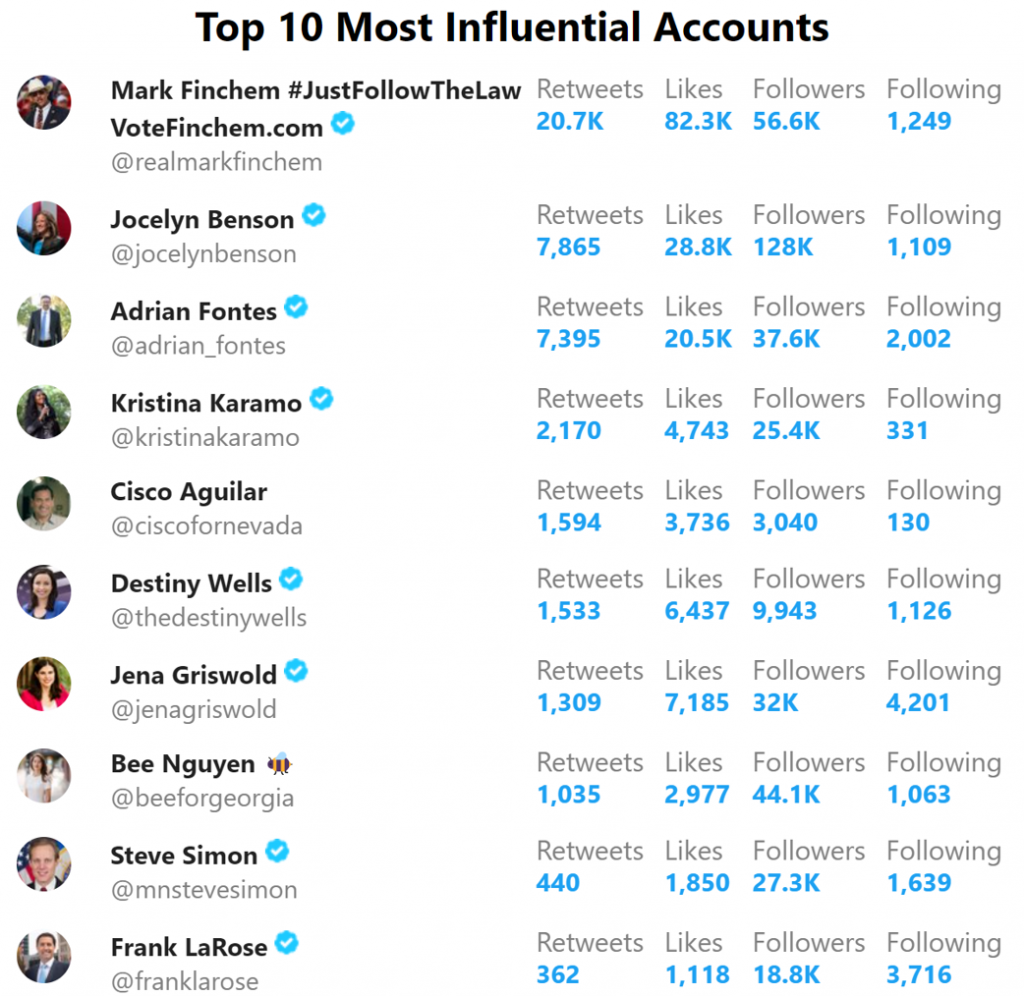
The most influential Twitter accounts affiliated with monitored secretary of state candidates between September 22 and October 21, rank ordered by retweets.
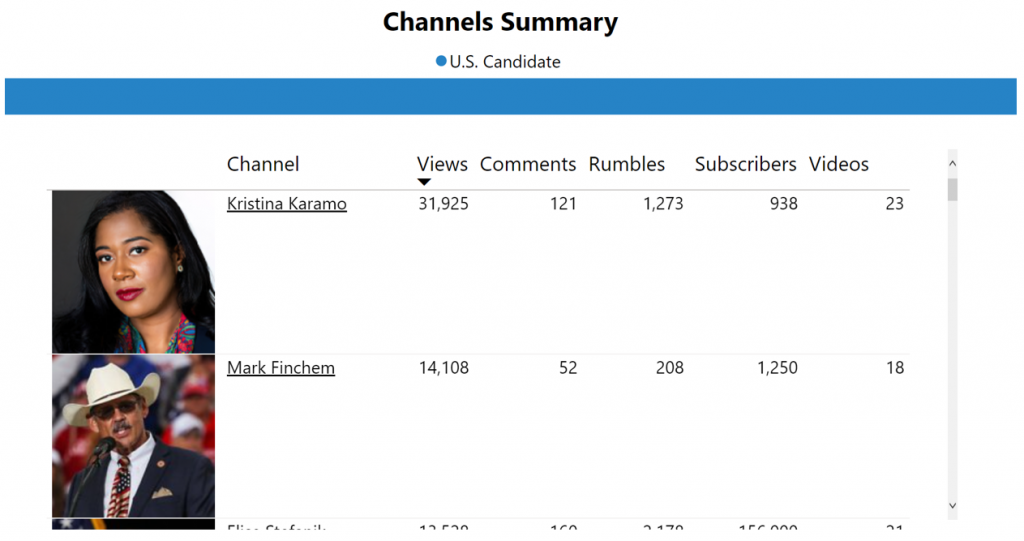
The two most viewed Rumble channels affiliated with all monitored candidates between September 22 and October 21.
National Media Coverage of Michigan
Between September 22 and October 21, Michigan was the seventh most mentioned state on Facebook and was tied for the eight most mentioned state on Instagram in election-related posts made by monitored national media accounts. (The appearance of Washington in both charts is a false positive based on references to Washington, DC.) The most engaged-with election-related posts during that period were generic reports about poll numbers; however, the arrest of the CEO of a Michigan-based election worker management company also received significant coverage from conservative commentators and national media outlets.
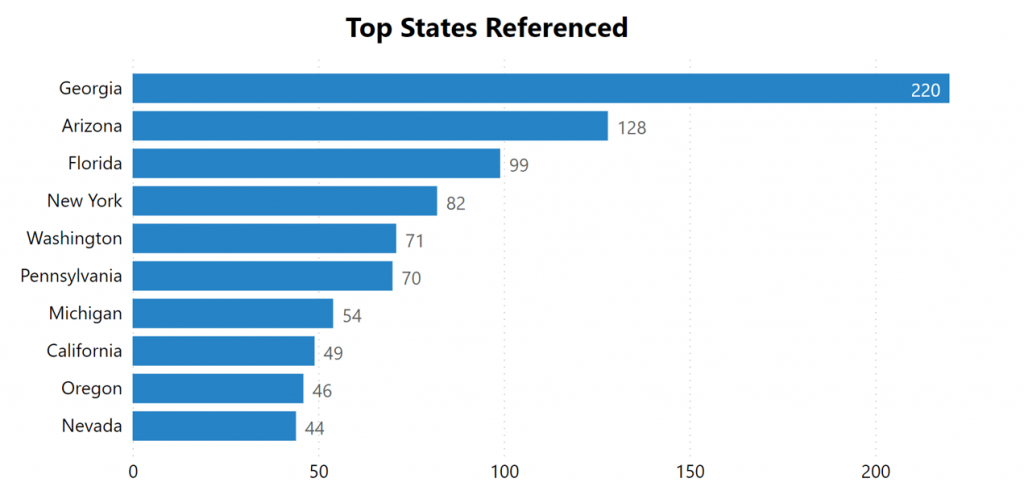
The most mentioned states by monitored national media outlets on Facebook in election-relation posts between September 22 and October 21.
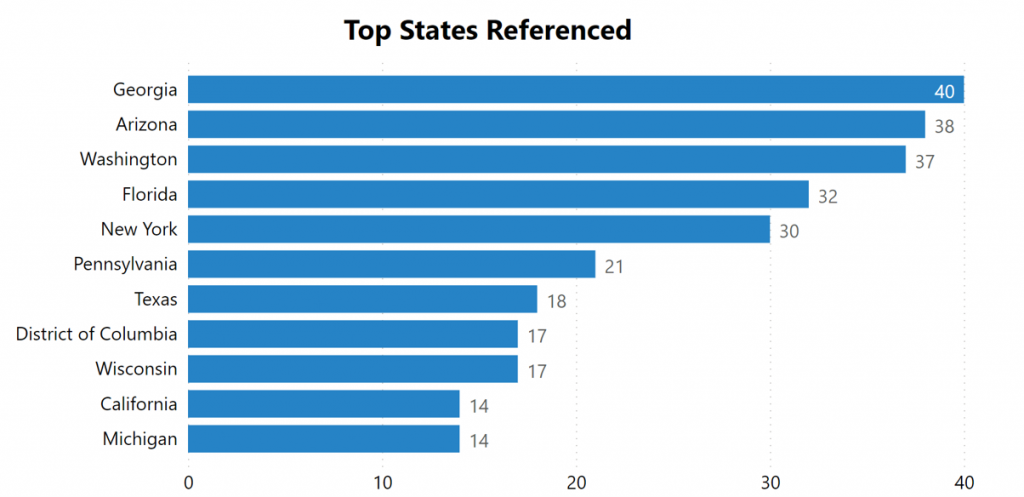
The most mentioned states by monitored national media outlets on Instagram in election-relation posts between September 22 and October 21.
Secretary of State Candidates Dominate Election Integrity Conversations in Michigan
Between September 22 and October 21, nine of the ten most retweeted posts about election security by monitored candidates in Michigan were made by either Jocelyn Benson or Kristina Karamo, with the two candidates staking out vastly different positions on the issue. Benson tweeted about the dangers of election-related misinformation, threats to election officials and poll workers, and voter intimidation, while Karamo largely focused on claims of widespread voter fraud in the 2020 election and Benson’s alleged misdeeds as secretary of state—including allegations that she broke the law. Karamo was particularly active in spreading doubt about election integrity on Rumble, where she has posted 19 episodes, and counting, of a self-produced series titled “Benson’s Dirty Deeds.” The video series includes allegations that Benson is working with liberal activist George Soros to “dismantle the very foundation of our Republic,” that Benson overlooked evidence of the use of so-called “ballot mules,” and that scores of illegitimate votes were cast in East Lansing, Michigan during the 2020 election. The latter claim was presented as proof of “large-scale voter fraud.” (The East Lansing claim was based on a report—authored by a woman who was removed from her role at a non-profit news organization—that has been refuted by a former East Lansing clerk.) Despite the fact that nine monitored candidates in Michigan have at least raised questions about—if not outright denied— the results of the 2020 election, Karamo was the only candidate to regularly embrace election fraud narratives. (Though GOP House candidate John Gibbs retweeted a post claiming that the results of Italy’s election—where a conservative candidate won—were the expected results when you “count each vote once.”)
Michigan Konnech-tion to Arrested CEO of Election Management Company
The arrest in early October of Eugen Yu, the CEO of Konnech, a Michigan-based company that makes software for scheduling poll workers, has provided grist for the mill of election denialism. Yu was arrested on suspicion of theft of personal identifying information of Los Angeles County poll workers based on allegations that he stored sensitive data on servers based in China. Despite the fact that prosecutors stressed that “the alleged conduct had no impact on the tabulation of votes and did not alter election results,” the arrest was used by prominent pundits to fuel suspicion about the integrity of voting machines. It was also the subject of episode 14 of Kristina Karamo’s “Benson’s Dirty Deeds” series on Rumble, and the arrest was mentioned in at least three tweets by Kristina Karamo, who blasted Secretary of State Benson for her “silence” about the arrest. The Konnech case received limited coverage in local Michigan media outlets, and no coverage from Chinese state media outlets.
The views expressed in GMF publications and commentary are the views of the author alone.

